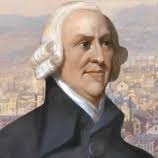
The window overlooked a quiet street in Kirkcaldy, Scotland. Outside, merchants shouted prices. Inside, young Adam Smith sat with a candle, writing by hand. He wasn’t chasing wealth; he was trying to answer something far trickier: Why do people work the way they do? He watched townspeople haggle, share, cheat, and give. He didn’t just observe trade; he observed motives. That’s what fascinated him. Adam Smith’s philosophy was never just about coins; it was about choices. Why we make them. Why they help. What they cost. He changed how we think about value, power, and the invisible threads that link one person’s needs to another’s gain.
Adam Smith's Early Life
Born in 1723, Adam Smith grew up in a small town by the sea. His father died before he was born. His mother, sharp and devoted, raised him to question everything, including himself. Not much is documented from Adam Smith’s childhood, but what survives suggests a boy more curious than restless. He watched the world closely. He listened more than he spoke. He studied at Glasgow, then Oxford, but it wasn’t the lectures that shaped him; it was what he read on his own. Cicero. Newton. Moral philosophers and natural scientists. He read about everything. Devoured it all. He wasn’t rich. He wasn’t loud. He wasn’t flashy, but his mind? It never stopped working, never stopped asking questions: Why do humans organize life? What’s fair? What works? His curiosity led to a life of thinking out loud, captivatingly, clearly, and in ways that still echo today.
Why Adam Smith Still Matters
Picture a shopkeeper pricing bread, a student picking a college major, or a company debating wages. Somewhere in the background, Adam Smith is still whispering: What motivates this choice? What’s the cost? Who benefits? His ideas? They not only survived the passage of time, they stuck and shaped things around them. Adam Smith is often called the father of economics, but in truth, the title barely covers his work. Smith didn’t just chart supply and demand; he mapped human behavior. He looked at how self-interest, when balanced with empathy, could build systems that actually work. Not perfectly, but functionally, morally, and sustainably, and he did it long before “economics” was a field at all. In The Wealth of Nations, he introduced ideas like the division of labor and the invisible hand, concepts that still shape policy, business, and even how we think about fairness, but that’s not all; he also wrote about ethics, pride, and generosity, though far too many people are eager to discount that part of his ideas. This is why, if you want a full Adam Smith biography, you shouldn’t just read his books; you should read about the people inspired by his works. Social entrepreneurs. Ethical investors. Civic reformers. Whether they quote him or not, they’re often working off his questions, because Smith didn’t tell the world what to want; he asked it to think harder about why it wants anything at all and what it was willing to do to get it.
Adam Smith’s books and beliefs
Adam Smith didn’t write for fame. He wrote to figure things out. He watched how people moved through markets, through friendships, through politics, and tried to make sense of it all. Not with rules. With reflection. That’s what made his work stick.
The Theory of Moral Sentiments
Long before he ever touched the economy, Smith asked a bigger question: Why do we care about anyone but ourselves? This book was his answer. It’s not economics; it’s empathy. Smith believed we carry a kind of internal mirror. He called it the “impartial spectator,” that little voice that says, “Come on, you know better.” That theory, weirdly elegant, is still echoed in everything from psychology to policy. If you want to know what grounded Adam Smith’s moral theory, start here. It’s where logic and conscience shake hands.
The Wealth of Nations
This one changed everything. Adam Smith’s most famous work isn’t just about money; it’s about how labor, trust, and shared benefit actually function. He noticed how splitting tasks in a pin factory made everything faster. He mapped how self-interest could (sometimes) lead to mutual good. But here’s what gets lost: Smith warned against greed. He called out monopolies, shady deals, and cronyism. He wanted freedom, not chaos. Fair systems, not unchecked winners. So if you’ve heard the phrase “invisible hand” and thought it meant “let the market do whatever,” read it again. Smith was subtler than soundbites give him credit for.
Other works and legacy
- Lectures on jurisprudence and legal systems
- Essays on astronomy, history, and logic
- Years spent editing others’ work—quietly shaping Enlightenment thought behind the scenes.
He didn’t churn out books. He didn’t need to. Two great works, a few lectures, and countless letters were enough. He gave us a new lens. Not just to see markets. But to see each other.
A man that shaped how we live
Adam Smith never built a company. Never ran a country. Never chased a spotlight. But his ideas outlived empires. Today, Adam Smith is known for shaping the foundations of modern economics. But what made him matter wasn’t just what he studied; it was how he saw. Trade, labor, empathy, power—he pulled them apart, asked better questions, and invited the world to think harder. His influence shows up in ways we don’t always notice: wage debates, tax policy, and public trust. Not because he handed us answers, but because he gave us better tools to think with. That’s the legacy of Adam Smith’s life history. Not capitalism. Not charts. Clarity. And the firm idea that systems should serve people, not the other way around.


